|
|
|
Sort Order |
|
|
|
Items / Page
|
|
|
|
|
|
|
| Srl | Item |
| 1 |
ID:
188587
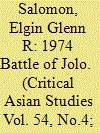

|
|
|
|
|
| Summary/Abstract |
Addressing the limitations of the dominant historiography of the Martial Law period (1972–1986) of the Philippines in Mindanao and the Sulu archipelago, this article provides testimonial narratives of witnesses and survivors of the 1974 Battle of Jolo as a counter-history. Tausug identity has been constructed and depicted by examining how the experiences of both Christian and Muslim Tausug shifted from cooperation to violence after this battle. The imposition of Martial Law and the 1974 Battle of Jolo not only caused displacement, property destruction, and casualties, it significantly contributed to the animosities between Christian and Muslim Tausugs that continue until the present.
|
|
|
|
|
|
|
|
|
|
|
|
|
|
|
|
| 2 |
ID:
164689
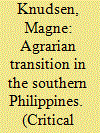

|
|
|
|
|
| Summary/Abstract |
On the southern Philippine island of Mindanao, scholars have documented a precarious land tenure, livelihood, and security situation for many smallholders. Agrarian political economy studies provide insightful analyses of the underlying causes of much poverty and violence on the island. Less attention has been given to cases of smallholder success. This article proposes that conditions for smallholder farming, even among ethnic minority groups, are more varied across the island than the literature suggests. In upland villages of north-central Mindanao, agrarian transition is a multi-directional process that produces different outcomes among households, kin groups, and villages. The main case study is a thriving mixed swidden and fixed field Maranao-Muslim farming village. Almost all the households in the village have successfully claimed land as their own and diversified and improved their livelihoods in recent times. To explain these positive outcomes, the article uses a relational approach and draws on anthropological literature on kinship, land tenure, and place to assess the bargaining power of smallholders in land deals. A stronger cross-fertilization of key insights in agrarian political economy and anthropological literature on kinship enriches the debate on agrarian transition in the southern Philippines.
|
|
|
|
|
|
|
|
|
|
|
|
|
|
|
|
| 3 |
ID:
156914


|
|
|
|
|
| Summary/Abstract |
This article investigates Twitter data related to the kidnapping case of two German nationals in the southern region of the Philippines by the Abu Sayyaf Group (ASG). It explores perceptions of the ASG, along with associated organizations and sentiments indicated in the tweets together with statistically significant relationships. Findings revealed that: “Rebel” and “Militant” were the most frequently used labels for the ASG; a majority of the tweets contained sentiments that assess threats such as abduction and kidnapping of hostages; and almost half contained words that indicate negotiation or concession to the demands of the captors. Logistic regression analyses on “Rebel” and “Islamist” revealed positive coefficients for these sentiments used as predictors. This meant that people who assessed threats and expressed sentiments that responders should concede to the captors’ demands were more likely to use the “Rebel” or “Islamist” labels. Rather than the two longstanding dominant narratives of the ASG as terrorists and criminals, the emerging rebel and militant labels suggest a more domestically and politically sensitive Twitter commentary than is represented in the work of the Al-Qaeda-centric paradigm exponents. These findings, along with the complex associated political and policy contexts and implications, are discussed in this article.
|
|
|
|
|
|
|
|
|
|
|
|
|
|
|
|
| 4 |
ID:
150605
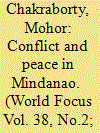

|
|
|
|
|
| Summary/Abstract |
The year 2014 will be commemorated in the history of Southeast Asia in general and the Philippines in particular as the year marking the almostpenultimate step towards the finale of a protracted separatist movement in the southern island of Mindanao, since the “Comprehensive Agreement on the Bangsamoro” was signed in Manila in March. Conceived as a nationalist struggle, aimed at the establishment of an autonomous homeland for the thirteen ethno-linguistic groups comprising the Philippine Muslims (‘Moros’), the historical roots of this movement run deep into the labyrinths of the colonial era. As a dominant group with a five-century old civilizational heritage, the Moros account for about 20% of the entire population of the Philippines and were originally concentrated in the southern provinces of the country.
|
|
|
|
|
|
|
|
|
|
|
|
|
|
|
|
| 5 |
ID:
178373
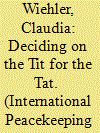

|
|
|
|
|
| Summary/Abstract |
Ceasefires are agreed in most intra-state conflicts and the majority of these agreements are violated. Yet, the subsequent dynamics of retaliation are still poorly understood. This article proposes a novel conceptual framework, describing the decision-making of conflict parties after ceasefire violations. I argue that the conflict parties face the two-fold decision-making problem of choosing a proportionate reaction: a reaction that assures their interest in the ongoing conflict and in the continuation of the agreement. When proportionate reactions are chosen, mutual compliance with the ceasefire can be re-established. The empirical implications of this framework are illustrated with evidence from two ceasefires in the Mindanao conflict in the Philippines. This article advances our analytical understanding of an overlooked period during armed conflict, i.e. while a ceasefire is in place. This is critical since collapsing ceasefires can lead to a deterioration of the humanitarian situation and of the prospects for peace. More generally, this article draws the attention to the counter-intuitive function of violence to secure cooperation in intra-state conflicts.
|
|
|
|
|
|
|
|
|
|
|
|
|
|
|
|
| 6 |
ID:
129122


|
|
|
| 7 |
ID:
159457
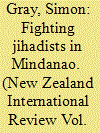

|
|
|
|
|
| Summary/Abstract |
Simon Gray suggests that defeating the Islamic State in the Philippines requires more than military
|
|
|
|
|
|
|
|
|
|
|
|
|
|
|
|
| 8 |
ID:
144913
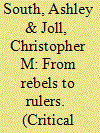

|
|
|
|
|
| Summary/Abstract |
This article presents a critical comparison of the ongoing peace processes in the southern Philippines and Myanmar (Burma). It does so by examining two key armed groups: the Moro Islamic Liberation Front (MILF) on Mindanao, and the Karen National Union (KNU) in Myanmar. We identify common elements that help to explain the relative – albeit incomplete – success of these two groups in navigating their respective peace processes. The MILF and KNU are ethnonationalist armed groups struggling for self-determination against states that are experienced by ethnic minority communities as culturally alien, and economically and politically dominant. Both conflict actors are characterized by complex combinations of “greed” and “grievance” factors but nevertheless enjoy significant (albeit contested) political legitimacy among the communities they seek to represent. We explore the complex relationships between armed ethnic groups, conflict-affected communities, and civil society actors. We argue that engagement with civil society is a key element of success in the Mindanao peace process, which could be replicated in Myanmar. We examine the roles and changing nature of the state in the Philippines and Myanmar, and contrast the degrees of international involvement, as key variables in these peace processes. We observe that negotiations of comprehensive peace settlements are threatened by “the tyranny of elections” in Myanmar (2015) and the Philippines (2016), and observe the importance of including national parliaments in peace processes in a timely manner. The peace process between Manila and the MILF represents a rare example of a Muslim minority pursuing its political objectives through structured dialogue. The article focuses on the challenges faced by armed groups moving from insurgency to reinvent themselves as credible political actors and governance authorities. Our analysis draws on peace-building literature, specifically the phenomenon of “rebel governance.”
|
|
|
|
|
|
|
|
|
|
|
|
|
|
|
|
| 9 |
ID:
116336
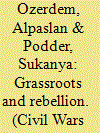

|
|
|
|
|
| Publication |
2012.
|
| Summary/Abstract |
An important aspect in the resolution of civil conflict pertains to the political transition of rebel groups, dissipation of their command structures and reintegration of former combatants. In this paper, we draw on empirical data collected in select communities of Lanao, Cotabato and Maguindanao provinces of Mindanao, Philippines during June 2010 to explore future trends in civilian support for the main separatist rebel outfit in Mindanao - the Moro Islamic Liberation Front (MILF). We test variance in the existence of recruitment pools among the two main Muslim ethnic groups - the Maranao and the Maguindanao. Our findings suggest that recruitment into MILF is not simply about religion or ideology, this is a simplification of its underlying support base. Several factors such as geographic location, especially proximity to Armed Forces of the Philippines camps, and conflict-related impacts of displacement, together with disparity in governance delivery levels, have resulted in divergence in levels of support for the Bangsamoro struggle between the two main ethnic groups. These variables will have an impact on the future existence of the MILF as a rebel movement.
|
|
|
|
|
|
|
|
|
|
|
|
|
|
|
|
| 10 |
ID:
099854
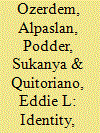

|
|
|
|
|
| Publication |
2010.
|
| Summary/Abstract |
The cessation of the governmental offensive to eliminate key figures of the separatist Moro Islamic Liberation Front (MILF) in 2009 imparted fresh impetus to the peace process in Mindanao, Philippines. Recent clashes have resulted in large-scale and ongoing displacement. This stalemate, together with the end of Gloria Macapagal Arroyo's Presidential term, has revived concerns about the future dynamics of the Bangsamoro struggle. An important dimension in this is the 'voluntary' nature of the participation of children and young people in the ranks of the MILF, sanctioned and often encouraged by their families and community. This presents an interesting contrast to the predominant literature on child soldiering that seems overly aligned with the coercive recruitment and related trauma-healing axis. In this article we examine the role of identity, ideology, the family and community in this presumed voluntary participation of children and youth in the MILF, in order to refine the linkage between recruitment experience of children and youth and their reintegration outcomes, and prescribe more appropriate reintegration interventions for youth in scenarios of participation sanctioned by family and community.
|
|
|
|
|
|
|
|
|
|
|
|
|
|
|
|
| 11 |
ID:
137221
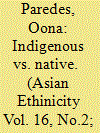

|
|
|
|
|
| Summary/Abstract |
Two categories of ethnic minority – Moro and Lumad – are indigenous to the Philippine island of Mindanao, with Muslim Moros outnumbering largely animist Lumads. Both have been profoundly displaced by the post-World War II influx of Christian Filipino settlers from other islands, leading to armed conflict with the national government over land and political control. Due to their political and demographic inferiority to Moros, Lumads have regularly resorted to the accommodation and assimilation of Moro priorities, including throwing their support behind the latters’ decades-long struggle for territorial autonomy. Thanks to wide public support among the Lumad and other Mindanao sectors, the latest peace talks between the government and Moro leaders has led to the signing of a major peace deal involving the creation of a new autonomous Bangsamoro homeland. Despite this, the legitimate needs of Lumad stakeholders have been ignored, and in some cases deliberately undermined, by Moros and the national government. This article analyses the post-conflict status of the Lumad who, as second-order minorities in the future Bangsamoro homeland, have been doubly marginalized in daily life and in the peace process. It concludes that denying Lumad concerns now will render Bangsamoro more vulnerable to legal and constitutional challenges, as well as jeopardize the unique ‘tri-people’ ethos that has made this the most firmly grounded peace process to date.
|
|
|
|
|
|
|
|
|
|
|
|
|
|
|
|
| 12 |
ID:
183457
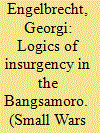

|
|
|
|
|
| Summary/Abstract |
Over sixty years of conflict in the Southern Philippines, between the government and separatist groups, have made Mindanao and the Sulu Archipelago an area prone to violence. Armed groups in Bangsamoro and their historical antecedents have often local origins. Even the original rebellion of the Moro National Liberation Front (MNLF) from which the Moro Islamic Liberation Front (MILF) emerged, the largest rebel force in the area and current leader of a transition government in the Bangsamoro, was a coalition of armed elements across Mindanao that organized together before becoming a stronger united front. The following article will describe the evolution of the armed rebellion in Mindanao and analyse its subsequent trajectory, proposing four reinforcing lenses to understand the various Moro insurgencies and explain local splintering and contradictions within the rebel movement.
|
|
|
|
|
|
|
|
|
|
|
|
|
|
|
|
| 13 |
ID:
153267
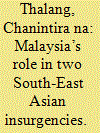

|
|
|
|
|
| Summary/Abstract |
The conflicts in Thailand’s southern border provinces and Mindanao have not only posed a challenge to the Thai and Philippine governments, but have also affected the respective governments’ relations with Malaysia. From a comparative perspective, this article aims to illustrate how a complicated web of interactions between domestic and international factors has not only shaped domestic decision-making, but also influenced how states interact with one another in regard to the conflicts, which has resulted in a mix of cooperation and contention. It is argued that despite past downturns in bilateral relations, various developments have paved the way for Malaysia to play a role in the current peace processes in Thailand’s southern border provinces and Mindanao. However, Malaysia has been able to accomplish more in Mindanao’s peace process due to several favourable conditions, including the Philippine government’s openness towards third-party involvement, regional security concerns and politics that have been less polarised until 2016.
|
|
|
|
|
|
|
|
|
|
|
|
|
|
|
|
| 14 |
ID:
166805
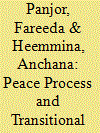

|
|
|
|
|
| Summary/Abstract |
The objective of this study is to understand the linkage between peace processes and transitional justice in armed conflict areas, comparing three experiences from Mindanao (the Philippines), Colombia, and Thailand’s Deep South in the implementation of transitional justice (TJ). The study found that the substantial success of conflict transformation in the Mindanao and Colombia peace processes resulted from balancing and emphasizing human rights and peace processes by applying significant transitional justice innovations at the implementation stage. Although the peace processes in Mindanao and Colombia evolved prior to 1996 and 1990, respectively, the peace process in Thailand’s Deep South commenced more recently, in 2013. Despite the time differences, this study helps us understand the relevance and importance of peace processes and transitional justice from each country, providing lessons for the progress of the peace process in Thailand’s Deep South.
|
|
|
|
|
|
|
|
|
|
|
|
|
|
|
|
| 15 |
ID:
137919
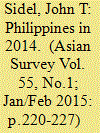

|
|
|
|
|
| Summary/Abstract |
The year 2014 in the Philippines witnessed President Aquino’s administration moving forward with initiatives on multiple fronts, including foreign relations and the peace process in Mindanao and the Sulu Archipelago, even as leading opposition politicians experienced increasing difficulties in the face of anti-corruption charges.
|
|
|
|
|
|
|
|
|
|
|
|
|
|
|
|
| 16 |
ID:
158946
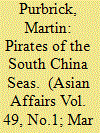

|
|
|
|
|
| Summary/Abstract |
Piracy has been endemic in the South China and surrounding seas for centuries. There is a long history of piracy waxing and waning depending on the political and economic situation in the region. There have been differing levels of piracy on the South China Coast and the seas around the Philippines, Malaysia, and Indonesia. In the Sulu and Celebes Seas as well as off the coast of Aceh, there are examples of piracy used as a tactic by groups also engaged in terrorism. Piracy has periodically been suppressed by a strong naval power in the region. The growth and projection of Chinese naval power to control the South China Sea to the extent of the ‘nine dash line’ has suppressed piracy on the China Coast and in the South China Sea, but had limited impact on the Straits of Malacca and the seas around Borneo and Mindanao.
|
|
|
|
|
|
|
|
|
|
|
|
|
|
|
|
| 17 |
ID:
175314
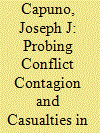

|
|
|
|
|
| Summary/Abstract |
Subnational and local hostilities are regarded as a distinguishing feature of Asian conflicts. Like the violent conflicts in Indonesia, Myanmar, Sri Lanka, those in Mindanao, Philippines are noted for their persistence and enormous welfare and economic costs. Extending recent empirical studies on Asian conflicts, here we examine the importance of spatial contagion as a factor behind the local incidence of conflicts and the associated casualties in the Autonomous Region of Muslim Mindanao. Estimating negative binomial regression models on a panel of cities and municipalities for period 2011–2016, we find strong evidence of contagion: both the frequency of violent hostilities and their related casualties in a locality are affected by past conflicts, especially those related to crime, in its contiguous neighbors. No such effect is found in the placebo tests involving random neighbors in the same province, thus ruling out that the estimated contagion effects is just a correlated reaction to a common environment.
|
|
|
|
|
|
|
|
|
|
|
|
|
|
|
|
| 18 |
ID:
163209
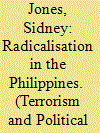

|
|
|
|
|
| Summary/Abstract |
The backgrounds of seven suspects arrested in connection with a September 2016 bombing in Davao, Philippines provide clues to how extremist ideology and support for ISIS took root in a middle-class urban environment. The seven men, part of the coalition that eventually took over Marawi in 2017, were drawn in by the idea of a caliphate, propaganda videos that became discussion material for charismatic young religious scholars, and the pull of friends and family. They represented overlapping networks of neighbours, business partners, and students. Their interwoven journeys to violent extremism provide a glimpse into how ISIS managed to transcend traditional clan and regional loyalties in the Philippines, but much more research is needed among pro-ISIS detainees to understand the phenomenon and take measures to address it.
|
|
|
|
|
|
|
|
|
|
|
|
|
|
|
|
| 19 |
ID:
154474
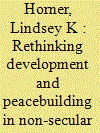

|
|
|
|
|
| Summary/Abstract |
This paper aims to positively engage with the religious character of many development contexts through an exploration of my own fieldwork in Mindanao. Through problematising a secular development industry and building on the momentum of the religious turn some scholars have identified, I share my initial explorations of how a postsecular framing might offer an alternative approach to development and peacebuilding. Through a deconstructive framing of the religious-secular binary I analyse the practices of one small non-governmental organisation (NGO) and suggest that a practice of ‘journeying with’ – Muslims and Christians on the shared philosophical/theological project to nourish each other’s faiths – can contribute to material and spiritual benefit, and the conditions to enable this.
|
|
|
|
|
|
|
|
|
|
|
|
|
|
|
|
| 20 |
ID:
019910
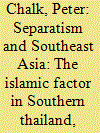

|
|
|
|
|
| Publication |
2001.
|
| Description |
241-270
|
|
|
|
|
|
|
|
|
|
|
|
|
|
|
|
|
|
|
|
|